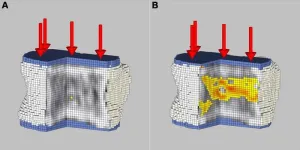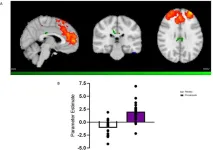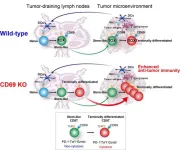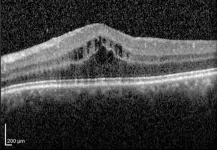(Press-News.org) The American College of Medical Genetics and Genomics (ACMG) has released updated recommendations for CFTR carrier screening –Updated recommendations for CFTR carrier screening: A position statement of the American College of Medical Genetics and Genomics. Pathogenic variants in the CFTR gene can cause cystic fibrosis (CF) as well as CF-related disorders. The new updated ACMG CFTR variant list includes a set of 100 variants.*
The new CFTR variant list represents an updated minimum recommended variant set for CF carrier screening and supersedes the previous group of 23 CFTR variants recommended by the ACMG. These revised recommendations apply to carrier screening, a type of genetic testing used to determine whether a person possesses a genetic variant associated with a condition that typically requires the presence of two pathogenic variants in order to manifest a phenotype. These revised recommendations do not apply to CFTR variant testing for diagnosis or newborn screening. All other aspects of the updated 2020 ACMG CFTR technical standards still apply.
“When it was originally developed, the previous variant list set the standard for CF carrier screening in the country. Now that our databases and technologies have evolved, it was time to raise the bar and set a new minimum standard. This new recommended variant set should help ensure that CFTR variant detection is more equitable among individuals representing a variety of biogeographic ancestries,” said lead author, Joshua L. Deignan, PhD, FACMG.
The updated minimum variant set for CF carrier screening is based on evidence that the variant has been established as CF-causing and is present in the Genome Aggregation Database (gnomAD), the largest and most widely used publicly available collection of population variation from harmonized sequencing data. For this 2023 version, a conservative approach was used with a framework that only incorporates well-established pathogenic and likely pathogenic variants to minimize concerns that individuals would make reproductive decisions based on limited information. Future versions of this minimum variant set should reassess the feasibility and utility of incorporating additional information from other population databases to be as biogeographically diverse as possible.
History of ACMG’s CFTR Carrier Screening Recommendations
The ACMG has long been involved in addressing the topic of CFTR carrier screening. In 2001, several professional organizations joined in acknowledging the importance and technologic advances that would make CF amenable to population-based carrier screening. However, the technology and knowledge had not advanced far enough to allow for an equitable application. Sequencing technology was also early in development. This limited screening applied to just small sets of variants that were most commonly characterized in Ashkenazi Jewish and Northern European populations. For this reason, recommendations at that time were that screening should be “offered” to those of Ashkenazi Jewish and Northern European descent and “made available” to other groups.
The ACMG ultimately recommended a set of 25 disease-causing variants, later reduced to 23 to represent a minimum variant set for pan-ethnic carrier screening of individuals with no family history of CF. This minimum variant set (often referred to as the “ACMG-23”) remained unchanged since then, even as molecular diagnostic technologies and genetic knowledge have dramatically advanced.
The original recommendation allowed the option for laboratories to offer an expanded CFTR variant set beyond the recommended set and, at the time, expanded variant sets were met with some controversy. However, several aspects have now evolved, including the widespread availability of cost-effective, high-throughput DNA sequencing as well as more standardized variant classification and interpretation. In 2020, the ACMG published an updated set of technical standards for CFTR variant testing which recommended that laboratories could now use either targeted or comprehensive methods for testing and at the time reaffirmed the original set of 23 variants as the minimum set for CF carrier screening.
In 2021, the ACMG published a new carrier screening clinical practice resource which continued to recommended offering testing of CFTR (now along with many additional genes) to all pregnant individuals as well as those planning a pregnancy.
*Note: The authors do not recommend use of the term “ACMG-100” when referring to the new minimum variant set.
About the American College of Medical Genetics and Genomics (ACMG) and
ACMG Foundation
Founded in 1991, the American College of Medical Genetics and Genomics (ACMG) is a prominent authority in the field of medical genetics and genomics and the only nationally recognized medical professional organization solely dedicated to improving health through the practice of medical genetics and genomics. The only medical specialty society in the US that represents the full spectrum of medical genetics disciplines in a single organization, the ACMG provides education, resources and a voice for more than 2,600 clinical and laboratory geneticists, genetic counselors and other healthcare professionals. ACMG’s mission is to improve health through the clinical and laboratory practice of medical genetics as well as through advocacy, education and clinical research, and to guide the safe and effective integration of genetics and genomics into all of medicine and healthcare, resulting in improved personal and public health. Genetics in Medicine and the new Genetics in Medicine Open, a gold open access journal, are the official ACMG journals. ACMG’s website, www.acmg.net, offers resources including policy statements, practice guidelines, and educational programs. The ACMG Foundation for Genetic and Genomic Medicine works to advance ACMG educational and public health programs through charitable gifts from corporations, foundations and individuals.
END
Which CFTR variants should be tested by laboratories? The ACMG releases updated carrier screening recommendations for cystic fibrosis
The American College of Medical Genetics and Genomics (ACMG) has released updated recommendations for CFTR carrier screening: "Updated recommendations for CFTR carrier screening: A position statement of the ACMG."
2023-06-13
ELSE PRESS RELEASES FROM THIS DATE:
Weight-loss surgery weakens bones of teens and young adults
2023-06-13
OAK BROOK, Ill. – A common weight-loss surgery for obese adolescents and young adults is found to have harmful effects on bones, according to a study published in Radiology, a journal of the Radiological Society of North America (RSNA).
“Childhood obesity is on the rise and weight-loss surgery is the most effective way to reduce weight and improve cardiometabolic comorbidities,” said the study’s lead investigator, Miriam A. Bredella, M.D., professor of radiology at Harvard Medical School in Boston, Massachusetts, and vice chair for Faculty Affairs and Clinical Operations, Department of Radiology ...
PeerJ announces Open Advances, a new journal series to address the world’s biggest challenges by unlocking Open Access
2023-06-13
PeerJ, the award-winning Open Access publisher, has announced the launch of the Open Advances series of journals, part of its ongoing commitment to democratizing scientific communication. The series will foster an equitable approach that empowers researchers worldwide to contribute valuable insights towards solving global challenges. The journals will be fully Open Access but will not charge authors a fee to publish.
The Open Advances series is a transformative endeavor that cements PeerJ's commitment to openness, innovation, ...
Overpayments to Medicare Advantage Plans could exceed $75 billion in 2023, USC Schaeffer Center research finds
2023-06-13
June 13, 2023 – Enrollment in the Medicare Advantage program – which allows Medicare beneficiaries to get their health care through plans administered by private insurance companies – has been growing so rapidly that it has recently surpassed enrollment in traditional Medicare. A new analysis by USC researchers warns that overpayments to Medicare Advantage plans now exceed 20 percent or $75 billion annually, underscoring the urgent need for reform.
Researchers with the USC Schaeffer Center for Health Policy & Economics found that the millions of beneficiaries in traditional Medicare who have switched to Medicare ...
Serotonin booster leads to increased functional brain connectivity
2023-06-13
Philadelphia, June 13, 2023 – Cognitive deficits accompany mood disorders and other psychiatric conditions, often with debilitating effects. Limited treatments currently exist, but studies in animals and humans have pointed to drugs such as the laxative prucalopride that activate serotonin receptors as a potential therapeutic for the symptoms. It has remained unclear, however, how the medication affects resting brain activity. Now, a new study in Biological Psychiatry: Cognitive Neuroscience and Neuroimaging, published by Elsevier, examines the drug’s effects in healthy human adults.
Serotonin receptors and the 5-HT4-type receptors in particular are found in areas ...
Positive parenting buffers stress’s effects on the brain
2023-06-13
Positive parenting—as reported by children and teenagers— protects young people from the deleterious effects of stressors like financial hardship or serious illness, according to a study. Jamie Hanson and colleagues examined magnetic resonance imaging (MRI) data along with survey data for 482 participants in an ongoing study, the Healthy Brain Network, who were between the ages of 10–17 at the time of data collection. Previous work has found associations between stress and small hippocampal volumes as well as between stress and behavioral problems—associations confirmed ...
DESI early data release holds nearly two million objects
2023-06-13
The universe is big, and it’s getting bigger. To study dark energy, the mysterious force behind the accelerating expansion of our universe, scientists are using the Dark Energy Spectroscopic Instrument (DESI) to map more than 40 million galaxies, quasars, and stars. Today, the collaboration publicly released its first batch of data, with nearly 2 million objects for researchers to explore.
The 80-terabyte data set comes from 2,480 exposures taken over six months during the experiment’s “survey validation” phase in 2020 and 2021. In this period ...
Treating wastewater using passive processes
2023-06-13
Human activities have a significant impact on natural waters, aquatic biodiversity and the quality of drinking water resources. For Professor Mathieu Lapointe of the Department of Construction Engineering at École de technologie supérieure (ÉTS), it is possible to treat certain types of wastewater—not currently treated—globally using more sustainable and affordable in situ methods.
In a study carried out by Professor Lapointe and published in the Nature journal, the rate of discharge into the environment of certain ...
Scholastica announces CRediT Taxonomy support across its journal publishing solutions
2023-06-13
CHICAGO, IL (June 13, 2023) — Scholastica, a leading academic journal publishing software provider, has announced CRediT Taxonomy support across its products and services in line with ANSI/NISO guidelines. The CRediT Taxonomy, which consists of 14 research contributor roles, helps facilitate transparency around research development processes and ensure proper acknowledgment of all contributors.
With the new CRediT implementation, journals using Scholastica's peer review system can request to have CRediT fields added to their submission form, ...
The benefits of Anti-CD69 antibodies for future cancer therapies
2023-06-13
CD8+ T cells, a vital component of the immune system that provides immunity against cancer, have been the focal point of anti-cancer therapies. Recent studies have identified two major subpopulations of these cells present within the tumor—the stem-like cells that do not have anti-tumor activity, and the terminally differentiated CD8+ T cells, which are generated from the stem-like cells and have cytotoxic function on tumor cells. Tumor-draining lymph nodes (TDLNs) have been found to be the primary site for the presence of these cells. However, the molecular mechanisms responsible for the generation of stem-like cells into terminally differentiated ...
Intraocular corticosteroids best for treating complications of chronic inflammatory eye condition
2023-06-13
Repeat treatment with corticosteroid injections improved vision in people with persistent or recurrent uveitis-related macular edema better than two other therapies, according to results from a clinical trial funded by the National Eye Institute (NEI). Compared with methotrexate or ranibizumab intravitreal (in-the-eye) injections, the corticosteroid treatment achieved greater reductions in retinal swelling and was the only therapy in the study that improved vision. The report was published today in the journal Ophthalmology. NEI is part of the National Institutes of Health.
“Prior to this study, we didn’t know the best treatment for persistent or recurrent macular edema, a major ...
LAST 30 PRESS RELEASES:
Kidney cancer study finds belzutifan plus pembrolizumab post-surgery helps patients at high risk for relapse stay cancer-free longer
Alkali cation effects in electrochemical carbon dioxide reduction
Test platforms for charging wireless cars now fit on a bench
$3 million NIH grant funds national study of Medicare Advantage’s benefit expansion into social supports
Amplified Sciences achieves CAP accreditation for cutting-edge diagnostic lab
Fred Hutch announces 12 recipients of the annual Harold M. Weintraub Graduate Student Award
Native forest litter helps rebuild soil life in post-mining landscapes
Mountain soils in arid regions may emit more greenhouse gas as climate shifts, new study finds
Pairing biochar with other soil amendments could unlock stronger gains in soil health
Why do we get a skip in our step when we’re happy? Thank dopamine
UC Irvine scientists uncover cellular mechanism behind muscle repair
Platform to map living brain noninvasively takes next big step
Stress-testing the Cascadia Subduction Zone reveals variability that could impact how earthquakes spread
We may be underestimating the true carbon cost of northern wildfires
Blood test predicts which bladder cancer patients may safely skip surgery
Kennesaw State's Vijay Anand honored as National Academy of Inventors Senior Member
Recovery from whaling reveals the role of age in Humpback reproduction
Can the canny tick help prevent disease like MS and cancer?
Newcomer children show lower rates of emergency department use for non‑urgent conditions, study finds
Cognitive and neuropsychiatric function in former American football players
From trash to climate tech: rubber gloves find new life as carbon capturers materials
A step towards needed treatments for hantaviruses in new molecular map
Boys are more motivated, while girls are more compassionate?
Study identifies opposing roles for IL6 and IL6R in long-term mortality
AI accurately spots medical disorder from privacy-conscious hand images
Transient Pauli blocking for broadband ultrafast optical switching
Political polarization can spur CO2 emissions, stymie climate action
Researchers develop new strategy for improving inverted perovskite solar cells
Yes! The role of YAP and CTGF as potential therapeutic targets for preventing severe liver disease
Pancreatic cancer may begin hiding from the immune system earlier than we thought
[Press-News.org] Which CFTR variants should be tested by laboratories? The ACMG releases updated carrier screening recommendations for cystic fibrosisThe American College of Medical Genetics and Genomics (ACMG) has released updated recommendations for CFTR carrier screening: "Updated recommendations for CFTR carrier screening: A position statement of the ACMG."





